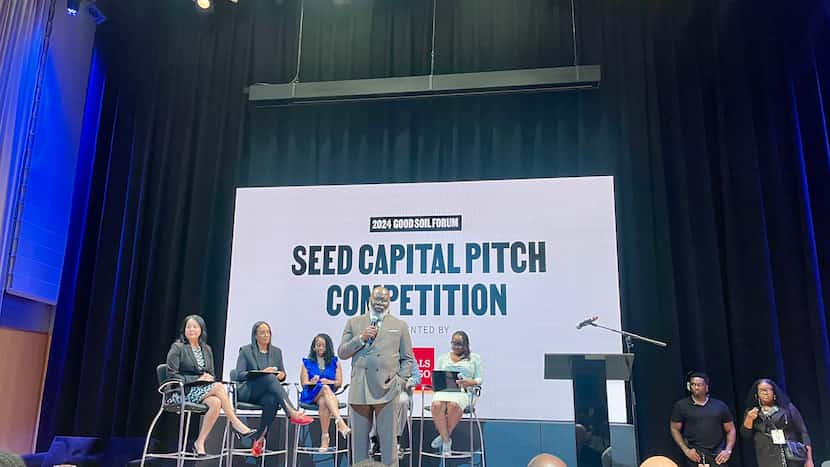Ameka Coleman knew she would win the top prize of $200,000. She had prayed for it.
As she woke up on Friday at the Residence Inn in downtown Dallas, she felt calm. God had prepared her for this moment. She filled the hotel bathroom with steam from the shower and the day’s worship song: “Big” by Pastor Mike Jr.
“(My God) He’s working (He’s working) A miracle (A miracle) Just for me (Just for me) And it’s gonna be (And it’s gonna be big).”
Coleman styled her hair with the same Strands of Faith products she’d sell the judges on later that afternoon: a lightweight moisturizing cream and a creamy twisting butter.
“This is already mine,” Coleman, 39, said to herself before heading to the pitch competition at the AT&T Performing Arts Center. “This is already mine.”
The seed pitch competition was a part of the Good Soil Forum, a project put on by the Dallas megachurch pastor’s T.D. Jakes Enterprises LLC. The Good Soil group aims to highlight the nation’s, as well as Dallas’, Black business and cultural scene while bringing thousands of people and dollars to North Texas.
The Shark Tank-style pitch contest encourages minority small business owners and entrepreneurs such as Coleman to compete for grant prizes.
“I can feel a certain sense of anxiety in the room,” megachurch leader T.D. Jakes said as he kicked off the event.
Each contestant had five minutes to sell their company and how they’d use the cash to a panel of judges. The second-place winner would take home a $100,000 grant. Third place and the best entry from Dallas each would score a $75,000 grant, and the most improved participant would get $50,000.
At the inaugural Good Soil forum in Orlando last year, the total grant pool was $250,000. The conference brought more than 2,500 entrepreneurs, according to T.D. Jakes Enterprises.
This year’s startups included a training hub for basketball and volleyball athletes and a platform that matches employers to certified workforce rental homes.
“This competition is more than just a platform for pitching business ideas — it’s a catalyst for change and a powerful vehicle for empowering underserved entrepreneurs,” said Michael Phillips, the chief operating officer of T.D. Jakes Enterprises.

Coleman’s haircare company, specializing in revitalizing textured hair using cruelty-free ingredients, was founded in 2018 in Pearl, Miss. The idea is that, whether someone’s hair is kinky, coily, curly, wavy, straight or in locks, their strands are beautiful, she said.
“Can you believe that 80% of Black women feel like they have to switch their hair up from its natural state just to fit into corporate America?” Coleman said during her pitch. “That is totally unacceptable.”
Since starting her company, Cole said she has garnered more than 45,000 customers with a 68% retention rate, boosting the company to a $3.6 million brand. Strands of Faith has an exclusive contract with Premier, a leading group purchasing organization for hospitals across the country.
The additional capital will go toward hiring staff to introduce the product at 50 new hospitals, scale production and invest in purchasing raw ingredients, Coleman said.
“We know that small businesses and entrepreneurs are a vital part of our economic ecosystem and supporting their growth is more critical now more than ever,” said Michael Martino, head of the diverse customer segments of consumer, small and business banking at Wells Fargo.
The bank and the pastor entered a 10-year partnership last year, aimed at revitalizing neighborhoods and driving economic opportunity. Wells Fargo said it could give as much as $1 billion in capital and financing to the effort, in addition to grants from the Wells Fargo Foundation.
Dallas-owned QTP Foods scored second place and won the host award for a total of $175,000. Leah Whiten is the owner, head baker and operations and distribution manager for the company selling her grandmother’s pie recipe.
Atlanta-based Fruition Hat Company took home third place with a $75,000 prize, and Good News Fitness, an Upper Marlboro, Md., coaching brand, earned $50,000 as the most improved.
Outside of the contest, Good Soil hosted fireside chats with Black business leaders sharing how they scaled their projects.
One entrepreneur included Charles King. After King graduated from Howard Law School with an interest in becoming a talent agent, he took a job in the mailroom at the global entertainment firm William Morris Agency. He was making $300 a week, with nearly $100,000 in student debt, but was able to build connections and score meetings with agents. Eventually, he became an agent in training and ultimately became the first Black partner at the agency.
Then he left William Morris to start his own film production company, MACRO Studios. Since starting in 2015, the company has made nearly 20 feature films and two TV shows and collected fifteen Oscar nominations and three wins. MACRO’s projects include Judas and The Black Messiah, Sorry to Bother You and Fences.

The top quarter of companies backed by the fund are earning eight-figure revenues, Simone said.
But her work to back Black entrepreneurship has hit a legal wall. A U.S. federal court of appeals panel suspended the firm’s grant program for Black women entrepreneurs. The court ruled that the grant program likely is discriminatory.
“Now this is crazy. Funding Black women is violating a Civil Rights Act?” Simone said Friday.
The suit was brought on last year by a group led by Edward Blum, the conservative activist behind the Supreme Court case that ended affirmative action in college admissions.

The weekend pitch competition was the third largest of its kind and was supported by Dallas’ Small Business Center as an educational platform to build capacity for growth and success, said Joyce Williams, director of the center.
“It’s the first step in a multiyear plan to cultivate a thriving cultural hub for music, entrepreneurship and innovation in Texas — a space where inspiration meets practical tools to empower business growth and lasting success,” said Phillips of T.D. Jakes Enterprises.
Before leaving Dallas, Strands of Faith’s Coleman attended service at The Potter’s House, where Jakes is senior pastor, and stopped by a FedEx to mail home her oversized check to Mississippi. The cost of shipping a $200,000 check a couple of states east? $75, after the mail worker saw what she could do to lower the price.
“I won a big award, and I’m still being frugal,” Coleman said with a laugh.










